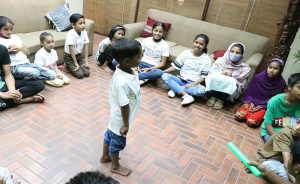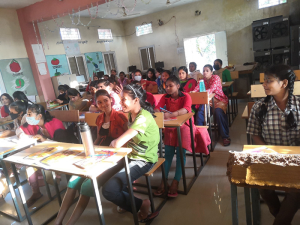Udayan Care’s FIT Project (Families In Togetherness)
Reintegration of children restored back to their families from Institutional Care in Delhi during COVID-19, supported by Martin James Foundation
PROJECT BACKGROUND
The sudden outbreak of the COVID-19 pandemic rattled the world, severely compromised the public health system, and decelerated the global economy. In this backdrop, the project explores the dynamics of the institutional care, out-of-home care (OHC) children and children who got restored from Child Care Institutions (CCIs) during COVID -19.
The project intervention focuses on effective reintegration post restoration to ensure prevention of re-separation as an essential principle of Alternative Care.
PROJECT VISION:
The Project Family aims to establish a demonstrable and scalable model of supporting families whose children have been sent back to them from children’s homes in Delhi. It seeks to ensure appropriate follow-up and linkages to social welfare schemes for family strengthening so that the family can care for and protect their children as they live with them. Directly it aims to support 50 families in Delhi and NCR, documents the learnings, and create a standard operating procedure for the successful reintegration of children with their families and communities.

PROJECT INTERVENTION STEPS:
- Identification and listing of 50 children (6-18 years of age) who have been sent back to their families during COVID in Delhi NCR.
- Developing a database of such families with a family background report and accessing all documentation of the child so far at the institutional level, child welfare committee, and other sources.
- Working closely with the families by developing a care plan for the child restored and an intervention plan for the families will include Individual assessment of children, assessing families, identifying strengths and needs, and writing their care plans.
- Family strengthening by the implementation of the childcare plan, family plan, including linkages with schemes and other welfare programs.
- Follow through for all children and families until reintegration is achieved and there is no likelihood of any unnecessary separation from family.
- Develop a model for the follow-up and reintegration.
Primarily an inclusive ‘child-centric best interests’ approach must be constructed as coping strategy. For this, needs and other social assessment must be conducted for developing stipulated goals and ameliorating interventions. Research and rehabilitative practices for children at risk will be context-specific and build on systems approach positioning casework as methodology.
Strengthening of community resources, family bonds, building resilience, social solidarity and frequent stakeholder interactions is needed for harnessing cooperation and collective advocacy. It is advisable to encourage children and provide them opportunity to engage with local governments for awareness cum confidence generation about COVID-19, distribution of essential resources on different platform, decision making and voicing their burdens and needs.

PROJECT OUTPUTS
- An implementable model with indicators of what makes a successful reintegration.
- Documented evidence of effective follow-up and linkages leading to full reintegration of children.
- Increased awareness in child protection functionaries on their role of follow up after restoration of children back to families and reintegration and an understanding of the right way to restore children to families and being able to differentiate between reunion and reintegration.
- 50 children and families supported with family strengthening through linkages.
- The complete framework has been developed with indigenous tools for data collection, assessments, and care planning for children, youth, and families.
Details of this can be seen at Circle of Care Framework: A Model for Reintegration of Children back to families from institutional care in India (changemakers for children.community)


